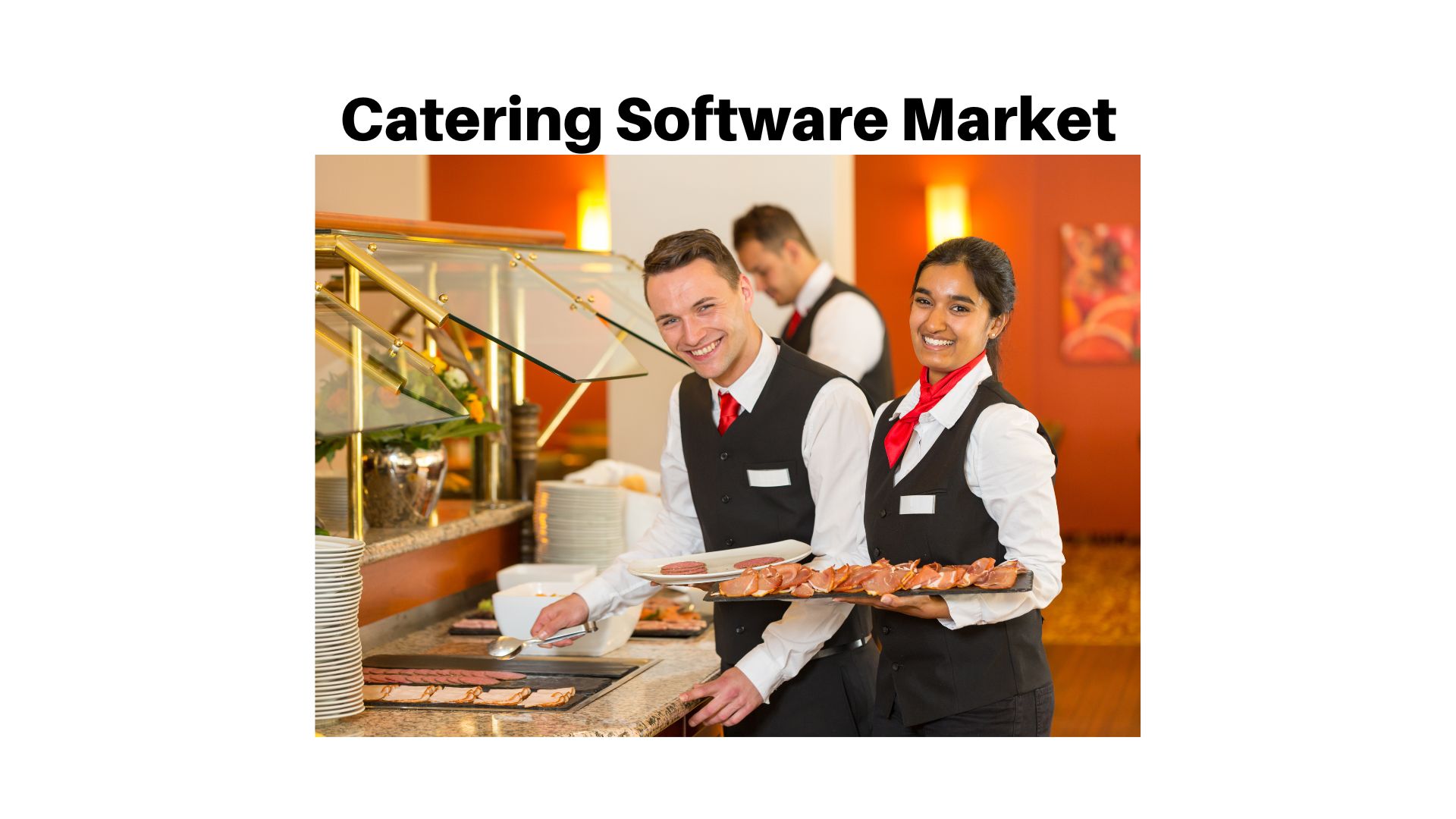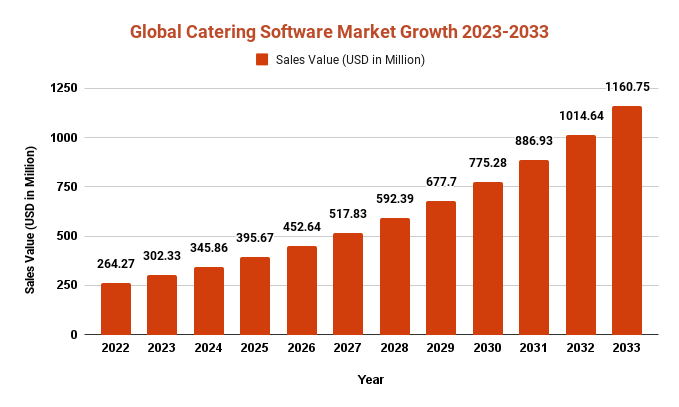Catering Software Market Set to Grow at a CAGR of 14.4% from 2023 to 2033

Page Contents
Market Overview
Published Via 11Press: Catering software Market is a type of program designed to assist caterers in managing and organizing their businesses. This type of application often contains features like menu planning, event management, inventory control, and customer relationship management. Menu planning enables caterers to customize menus for different events/occasions while managing dietary restrictions and preferences. Event management capabilities may include managing guest lists, RSVPs and timelines as well as contracts or proposals for clients.
The Catering Software Market size is expected to reach USD 1160.75 Mn by 2033, up from its current value of USD 264.27 Mn in 2022, growing at an annual compound growth rate (CAGR) of 14.4% from 2023-2033.
Inventory management features may include tools for tracking food and beverage inventory, as well as equipment and supplies. Customer relationship management capabilities could include tools for managing client contacts and preferences, sending marketing emails, and monitoring customer feedback. Catering software is used by a range of businesses such as catering companies, event planners, restaurants, hotels – some popular options being CaterTrax, Total Party Planner and Caterease.
Key Takeaways
- Catering software is designed to make the management and organization of caterers' businesses simpler.
- This type of software typically offers features for menu planning, event management, inventory management and customer relationship management.
- Menu planning capabilities enable caterers to design and customize menus for various events, while event management tools facilitate managing guest lists, RSVPs, and timelines.
- Inventory management features can assist caterers in monitoring and controlling food and beverage inventory, as well as equipment and supplies.
- Customer relationship management software enables you to maintain client contacts and preferences, as well as track customer feedback.
- Catering software can be utilized by a range of businesses, such as catering companies, event planners, restaurants and hotels.
- Popular catering software options include CaterTrax, Total Party Planner and Caterease.

Click Here To Access Sample Pages Of This Report: https://marketresearch.biz/report/catering-software-market/request-sample/
Regional Snapshot
- Catering software is a staple for North America's catering companies, event planners and restaurants. Popular options include CaterTrax, Total Party Planner and Caterease; these solutions typically provide features like menu planning, event management, inventory management and customer relationship management.
- Europe is a hub of catering software, used by caterers, hotels and event planners alike. Popular options include CaterSOFT, Caterbook and Function Tracker – these solutions often offer features for menu planning, event management and customer relationship management with an emphasis on table and seating arrangements.
- Asia is seeing an uptick in catering software use by caterers and event planners. Popular options include FoodRazor and HIOPOS, which typically offer features for menu planning, inventory management, event management with an emphasis on local cuisine and cultural events.
Inquire Here & Query for report: https://marketresearch.biz/report/catering-software-market/#inquiry
Drivers
- Efficiency and Productivity: Catering software helps caterers simplify their operations and automate tasks such as menu planning, inventory management, and event management. This can lead to increased efficiency and productivity, enabling caterers to focus on providing top-notch service to clients.
- Cost Savings: Catering software automates processes and reduces manual labor requirements, helping caterers save money on labor expenses. Furthermore, inventory management features can reduce food waste and minimize overstocking – further cutting costs in this area.
- Improved Customer Experience: Catering software can enable caterers to provide a superior customer experience by managing preferences, dietary restrictions and event details more effectively. This results in more personalized service and contented customers.
- Competitive Advantage: Adopting catering software can give caterers a strategic advantage by enabling them to provide more efficient and effective services than their rivals.
- Data Analysis: Catering software typically features reporting and analytics features that permit caterers to examine data on their business operations and performance. Doing so allows them to make informed decisions and enhance their strategies.
Restraints
- While catering software can offer many benefits to catering businesses, there are also some potential restraints to consider. Catering software can be costly to implement and maintain, particularly for smaller businesses. This can be a significant investment for businesses to make, and may not always be feasible for those with limited budgets.
- Catering software often has a learning curve for users, particularly for those who are not tech-savvy. This can lead to a slow adoption process and may require additional training and support to get users up to speed. While catering software typically offers a range of features and functionalities, businesses may have specific needs that require customization. Customization can be time-consuming and costly, and may not always be feasible for businesses.
- Catering software requires a reliable internet connection and may be affected by technical issues or outages. Businesses must have backup plans in place to ensure that they can continue to operate in the event of technological issues. Integrating catering software with existing systems and processes can be challenging, particularly for businesses with legacy systems or outdated processes. This can require additional resources and expertise to implement successfully.
Opportunities
- Mobile Applications: As more people turn to smartphones and mobile devices for event planning, catering software could develop more robust mobile applications to keep up with this trend. This would enable caterers to manage events and customer relationships from their handheld devices, offering greater convenience and flexibility in the planning of events.
- Integration with Other Systems: Catering software can be integrated with other systems, like point-of-sale or accounting software, to give caterers a more comprehensive overview of business operations. Doing so would enable caterers to make better informed decisions and enhance their overall business strategy.
- Artificial Intelligence and Machine Learning: As artificial intelligence and machine learning technology progresses, catering software could take advantage of these advances to enhance menu planning, inventory management, and customer relationship management. This would enable caterers to provide more personalized service while increasing their operational efficiency.
- Sustainability: As sustainability becomes more of a priority for consumers and businesses alike, catering software could offer features to enable caterers to track and manage their environmental impact. This could include tools for monitoring food waste or reducing carbon emissions.
- Online Ordering and Delivery: With the rise of online ordering and delivery services, catering software could develop features to support this trend. This could include tools for managing orders and deliveries online, as well as integration with third-party delivery services.
Challenges
- Integration: Integrating catering software with other systems can be a major hurdle. Many catering businesses rely on multiple tools and platforms for operations management, so integrating all these pieces together can be an intricate and time-consuming endeavor.
- Data Management: Catering software generates a vast amount of data, and effectively managing it can be daunting. Caterers must guarantee their information is accurate, up-to-date, and organized for easy access and analysis.
- User Adoption: Catering software can be complex, necessitating extensive training and support for users to become proficient in its use. Ensuring user adoption and engagement are essential elements for any successful catering software implementation.
- Security: Catering software often contains sensitive data, such as customer details, financial info and business operations. Ensuring the security of this data is essential; caterers must take measures to guard their systems from cyber threats and data breaches.
- Customization: Every catering business has specific requirements and processes, necessitating customized software to fit. Customizing software to meet these individual requirements can be a difficult challenge for smaller or less flexible solutions.
Market Segmentation
deployment model
- Cloud Based
- On Premise
Key Players
- OPTIMO software
- Pxier
- Total Party Planner
- Infor
- Horizon Business Services Inc
- Gather Technologies Inc
- CaterZen by Restaurant & Catering Systems
- CaterTrax Inc.
Report Scope
| Report Attribute | Details |
| Market size value in 2022 | USD 264.27 Mn |
| Revenue forecast by 2033 | USD 1160.75 Mn |
| Growth Rate | CAGR Of 14.4% |
| Regions Covered | North America, Europe, Asia Pacific, Latin America, and Middle East & Africa, and Rest of the World |
| Historical Years | 2017-2022 |
| Base Year | 2022 |
| Estimated Year | 2023 |
| Short-Term Projection Year | 2028 |
| Long-Term Projected Year | 2033 |
Growing Demand => Request for Customization
Recent Developments
- Contactless Payment: In response to the COVID-19 pandemic, many catering software solutions have implemented contactless payment capabilities on their platforms. This enables customers to pay for catering services without physically handling cash or credit cards – helping reduce the spread of the virus.
- Artificial Intelligence: Catering software has begun to incorporate artificial intelligence and machine learning technologies to assist caterers in making more informed decisions. These tools can assist with menu planning, inventory management, and customer relationship management (CRM), among other tasks.
- Online Ordering: Catering software has recently enhanced its features to offer online ordering and delivery services, enabling customers to place orders and receive catering services remotely – something which has become increasingly important during the pandemic.
- Mobile Applications: Many catering software solutions now feature mobile applications on their platforms, enabling caterers to manage their operations and communicate with customers from their smartphones.
- Cloud-Based Solutions: Cloud-based catering software solutions have seen a meteoric rise in popularity over the last several years due to their greater flexibility and scalability compared to traditional on-premise options. These cloud-based programs enable caterers to access their data and software remotely with an internet connection.
Key Questions
What is catering software?
Catering software is a type of program designed to assist caterers in managing their operations more effectively. This software typically offers features like menu planning, inventory control, customer relationship management, billing services and more – making it an invaluable asset to caterers everywhere.
What are the Benefits of Catering Software?
Catering software helps caterers streamline their operations, reduce errors, and provide better service to clients. It also assists with financial management, marketing strategies, and other crucial elements associated with running a catering business.
What are some popular catering software solutions?
Popular options include Caterease, Gather, Total Party Planner and CaterTrax, among others.
How much does catering software cost?
The price of catering software varies based on the solution and features offered. Some solutions require a subscription fee, while others may require an one-time purchase fee.
Can catering software be customized to fit the needs of individual businesses?
Absolutely. Many catering software solutions can be tailored to fit the unique requirements and needs of businesses, though this may entail additional development work or customization fees.
What are some challenges faced by catering software?
Catering software faces numerous obstacles, such as integration with other systems, data management, user adoption issues, security risks and customization requirements.
What are some recent advancements in catering software?
Recent innovations include contactless payment options, artificial intelligence and machine learning, online ordering and delivery services, mobile applications, as well as cloud-based solutions.
Contact us
Contact Person: Mr. Lawrence John
Marketresearch.Biz (Powered By Prudour Pvt. Ltd.)
Tel: +1 (347) 796-4335
Send Email: [email protected]
The team behind market.us, marketresearch.biz, market.biz and more. Our purpose is to keep our customers ahead of the game with regard to the markets. They may fluctuate up or down, but we will help you to stay ahead of the curve in these market fluctuations. Our consistent growth and ability to deliver in-depth analyses and market insight has engaged genuine market players. They have faith in us to offer the data and information they require to make balanced and decisive marketing decisions.